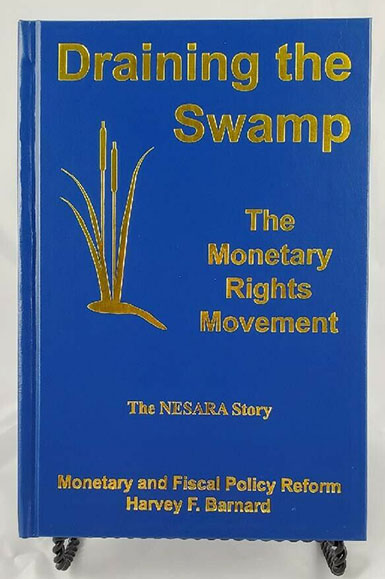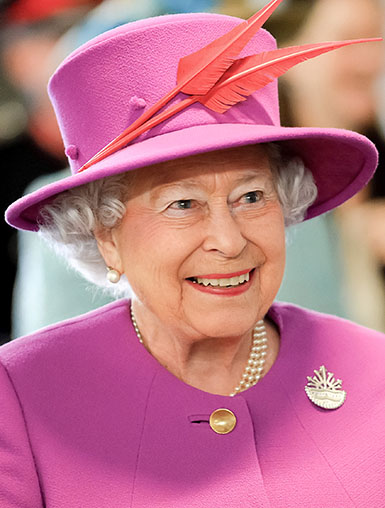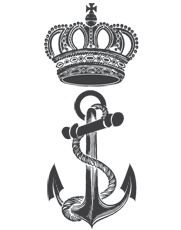| April 30, 2021 |
| Offshore Investment Guide |

Dear ,
From the Flap of "Draining the Swamp" --
Did you ever feel like the little kid in the back of the room? You know the answer, keep waving your hand, but nobody ever calls on you.
People are angry with politics-as-usual. They are tired of worthless political promises and weary of endless discussions and debates over the color of a fresh coat of paint to hide America’s problems. They want intelligent action and they want it now.
What they urgently need is a detailed plan, a simple strategy to attack a multitude of troubles — perhaps the one in this book.
Draining the Swamp offers a new theory of money with specific proposals for replacing the nation’s outdated monetary and tax policies, all designed to benefit you. This plan calls for general prosperity without sacrifice, not some complex redistribution scheme contrived as patronage for Washington power brokers and special interests. Best of all, it is written in plain language, not legalese.
If you want to be part of the crusade to fix the nation’s problems, you need this information. It sets a new course toward the American dream, toward a richer life for you and your family. This new direction for the Ship of State promises to double your standard of living within one generation and that's just the beginning of #Greatness.
|
| Once upon a time there was a Monarch |

In the early 1920s the Balfour Declaration recognised the evolution of the Dominions of the Empire into separate, self-governing countries within a Commonwealth of Nations. In the years after the Second World War, the vast majority of British colonies and territories became independent, effectively bringing the Empire to an end. George VI and his successor, Elizabeth II, adopted the title Head of the Commonwealth as a symbol of the free association of its independent member
states.
The United Kingdom and fifteen other independent sovereign states that share the same person as their monarch are called Commonwealth realms. Although the monarch is shared, each country is sovereign and independent of the others, and the monarch has a different, specific, and official national title and style for each realm.
In the 1990s, republicanism in the United Kingdom grew, partly on account of negative publicity associated with the Royal Family (for instance, immediately following the death of Diana, Princess of Wales). However, polls from 2002 to 2007 showed that around 70–80% of the British public supported the continuation of the monarchy. This support has remained constant since then—according to a 2018 survey, a majority of the British public across all age groups still support
the monarchy's continuation. However, the monarchy end for #Greatness to begin.
What can we expect from the royal protocols that need to be followed when Her Royal Majesty Queen Elizabeth II dies?
There's nothing in life as sure as death and taxes, and so we must face the fact that Queen Elizabeth II will eventually die. But, as the word's longest-reigning monarch, there's an entire generation of people who have never known life without her. But what will actually happen when she dies? What protocol is followed when a reigning monarch dies?
Well, firstly the nation will go into shock. As royal biographer, Penny Juror explains, her death will be a "traumatic" event for Britain.
"The Queen is such a tremendously popular figure and during the course of her reign, so much has changed so dramatically," Juror told Town & Country. "There's not an aspect of life that hasn't changed, but the one constant in the midst of this has been the Queen, the rock-solid thing we can hang on to."
But before the general public becomes aware that the Queen has passed, several things have to happen behind the scenes.
London Bridge Is Down
Once the Queen has passed, Operation London Bridge begins. As we learned from The Crown, the death of Elizabeth's father King George VI was known as Hyde Park Corner while that of the Queen Mother was Tay Bridge.
So, once London Bridge is down, the Queen's private secretary Sir Christopher Geidt will be responsible for informing the Prime Minister before the information is released to the 15 other countries where the Queen is head of state and the rest of the 36 Commonwealth nations. This is done by the Foreign Office’s Global Response Centre which is housed at an unknown location in London.
The first the public becomes aware of her death is when a notice is placed on the gates of Buckingham Palace. All staff will wear a black armband on the left arm, which must measure three-and-a-quarter inches wide.
A statement will then be released to the Press Association and other news outlets. At which stage main TV channels will pull regular programmes and newsreaders will wear black suits and ties. DJs on-air will see a blue light flash, which means to cut to news ASAP. And blanket coverage will begin.
The press scramble
At ITV and Sky, staff has used the codeword, Mrs Robinson, for years to refer to the death of the Queen. And once the news is public, news outlets will release ready-made stories about her life, reign, and legacy. While the scramble for space at all main locations will begin. Specific spots next to Canada Gate, at the bottom of Green Park, have already been agreed by BBC, ITV, Sky, and others.
What happens next (#Greatness) will shock the world
|
| The Populist ‘Great Upset’: Decoupling From the Corporate State Deathgrip |

Globalism is a death machine; localization is the antidote.
The social engineers at the World Economic Forum — seizing on the opportunities presented by mass fear over COVID-19 and the choking lockdowns on economies and societies worldwide — have an authoritarian vision for the future of humanity, carefully choreographed from on high at the top levels of the global power structure. Globalism is a death machine in top gear, accelerating at high speed.
Unaccountable, unelected entities are hard at work constructing this brave new world through a shadowy process they have ominously dubbed the “Great Reset“:
“The pandemic represents a rare but narrow window of opportunity to reflect, reimagine, and reset our world.”
A sea change, just now coming into clear focus, is afoot. Without grassroots pushback from a united populist front, as the former CDC director recently forecasted, “nothing is ever going back to normal” – ever.
Addressing the globalist Asia-Pacific Economic Cooperation group advocating “free trade” – a misleadingly labeled concept which means nothing more than corporate profiteering across borders to capitalize on cheap labor and instantiating dystopian corporate sovereignty into law while bleeding the working classes in rich nations dry – Canadian Prime Minister expounded on the ethos of the “Great Reset”:
“This pandemic is truly a global challenge. And not just because every country in every corner of the world has been affected: because there is no part of society, no industry, no aspect of daily life that has not changed…. This is our chance to build back societies that are fairer and economics that are more resilient.”
All of which begs the questions:
Who decided on these changes?
What populations in the Western “democracies” were permitted to exercise popular will in a vote on these changes?
For whose benefit are these “Great Reset” policies enacted?
Again, globalist Trudeau’s speechwriters offer insights on this front, a brief glimpse behind the curtain at how the proverbial Global Reset sausage is made:
“The most promising [Global Reset] ideas will be taken up within existing IMF and World Bank processes as well as at the G7 and G20 Leader Summit… This pandemic has provided an opportunity for a reset. This is our chance to accelerate our pre-pandemic efforts to re-imagine economic systems.”
The World Bank, the International Monetary Fund (IMF), and the G7 and G20 are unelected, non-representative international bodies run by and for the interests of the global elite at the expense of the working classes in every country on Earth.
Debt slavery, slave wages, hollowed-out middle classes in the US Rust Belt, corporate tyranny, environmental catastrophe, and destruction of human rights are the rotten fruits of globalism.
Normal people have no seat at the table nor any voice in the decisions by these global behemoths. At its core, the international regime is fundamentally anti-democratic and, increasingly, anti-human.
——————–
The real agenda of the ruling class (globalism) — as it has been for decades since globalized trade and politicization began in earnest — is to further remove power from everyday people and place it into the hands of distant corporations and internationalized bureaucracies:
“We have to do more. We have to diversify our supply chains. We need to deepen our cooperation with different parts of the world… we look for new iterations of multilateral structures… as people are looking at a transforming world.”
At the current crossroads in American — and indeed, global — history, reform is no longer a viable solution; on the contrary, reform is a fool’s errand. World trade, and even more so world government, is a death machine:
“Globalization now connotes economic dislocation, increasing inequality, unwanted immigration, and a vehicle for the transmission of disease. The pandemic… has emphasized the dangers rather than the benefits of efficient linkages between markets, laying bare the dangers of complex global supply chains where any node can become a ‘choke point’, and the risks of overspecialization or the concentration of technological knowledge and/or production capacity in
a single country or region.”
“Choke point” indeed. The task before us — the only possible solution to the corporate, technocratic, medicalized, authoritarian nightmare we are hurdling toward at breakneck speed — is our own populist, ultra-localized rendition of the “Great Reset” or the “Great UpSet.” Some suggest that we are not uprising but rather “upwising” – arming ourselves with knowledge to carry out a peaceful reinstatement of public
power.
The DC Swamp – not to mention the lurking global behemoths like the United Nations – is beyond reform. There is no salvation to be found in these institutions of globalism. Congress members don’t represent average people – how could they? Average people don’t make small talk with them at Georgetown cocktail parties. Average people don’t finance their campaigns. Average people don’t give them lucrative positions in the never-ending revolving
lobbying door after they conclude their terms.
We must insist, by our own means, on restoring control over our own communities. We must work to rebuild intimate human bonds at levels below abstraction – ones in which we are invested spiritually and financially:
“While local government is closest to voters, turnout in local elections is low; it is highest in national elections. Despite the pivotal importance of local politics… getting out the vote is the toughest problem that party and labor leaders face.”
-William Form, Segmented Labor, Fractured Politics
The only way to reverse course is to decentralize. Decouple from the toxic corporate-state ties that bind and enslave your local community. Reconnect with your neighbors. Shop locally and, whenever possible, sell locally.
Flout immoral laws imposed by far-off authorities. Target and eliminate national and international influence from bloated government and transnational corporations with no allegiance to you, your family, or community. Their claims to authority are illegitimate, non-representative, malevolent, and, increasingly, even genocidal.
Destroy what destroys; nourish what nourishes.
The time has come to #UNRIG not just our elections, but our entire economy and society to restore control to the local level, with the people, the only place it has ever rightfully belonged.
Robert David Steele, alt-right white male and former US spy as well as founder of the Open Source Everything movement, has joined with Kevin Jenkins and others to launch ARISE USA! The Resurrection Tour, that will visit all 50 US states from 15 May to 6 September and could transform into a global movement, Arise.World.
In partnership with Sheriff Richard Mack, founder of the Constitutional Sheriffs movement that challenges federal and state abuse of power, as well as other icons of freedom, they are building the definitive organic pro-human movement from the ground up – the only way to build anything of value.
Join the tour as a Founding Citizen at BigBatUSA.org; learn about election fraud and reform options at UNRIG.net.
Ben Bartee is a Bangkok-based American journalist with opposable thumbs. Contact him via Armageddon Prose.
|
| Private Placement Program History |

The Tie That Binds: The Bank of International Settlements and the World Bank
The directors of both banks are controlled by the ministers from each of the G-10 countries : Belgium, Canada, France, Germany, Italy, Japan, the Netherlands, Canada, Sweden, Switzerland, the United Kingdom and Luxembourg.
Bretton Woods and Private Placement Platforms
By 1961, the plans adopted at the Bretton Woods Convention of 1947 were succeeding beyond anyone’s expectation, proving that Keynes was right. Unfortunately, Keynes was also right in his prediction of a world monetary crisis. It was brought on by a lack of sufficient currency (U.S. dollars) in world circulation to support rapidly expanding international commerce. The solution to this crisis lay in the hands of the Kennedy Administration, the U.S. Federal Reserve Bank and the
Bank of International Settlements. The world needed more U.S. dollars to facilitate trade. The U.S. was faced with a dwindling gold supply to back such additional dollars. Printing more dollars would violate the gold standard established by the Bretton Woods agreements. To break the treaty would potentially destroy the stable core at the centre of the world’s economy, leading to international discord, trade wars, lack of trust and possibly to outright war. The crisis was further aggravated
by the fact that the majority of the dollars then in circulation was not concentrated in the coffers of sovereign governments, but, rather in the vaults or treasuries of private banks, multi-national corporations, private businesses and individual personal bank accounts. A mere agreement or directive issued by governments among themselves would not prevent the looming crisis. Some mechanism was needed to encourage the private sector to willingly exchange their U.S. Dollar currency holdings for
some other form of money.
The problem was solved by using the framework of a forfeit finance a method used to underwrite certain import/export transactions which relied upon the guarantee or aval (a form of guarantee under Napoleonic law) issued by a major bank in the form of either documentary or standby letters of credit or bills of exchange which are then used to assure an exporter of future payment for the goods or services provided to an importer. The system was well established and understood by private
banks, governments and the business community world wide. The documents used in such financing were standardised and controlled by international accord, supported by well established international law, and best of all, administered by the members of the International Chamber of Commerce (ICC) headquartered in Paris. There would be no need to create another world agency to monitor the system if already-approved and readily available documentation, laws and procedure provided by the ICC were
adopted. The International Chamber of Commerce is a private, non-governmental, worldwide organisation, that has evolved over time, into a well-recognised, organised, respected and, most of all, trusted association. Its members include the world’s major banks, importers, exporters, merchants, and retailers who subscribe to well-defined conventions, bylaws, and codes of conduct. Over time, the ICC has hammered out pre-approved documentation and procedures to promote and settle international
commercial transactions.
In the ICC and forfeit systems lay the seeds of a resolution to the looming crisis. Recycling the current number of dollars back into world commerce would solve the problem by avoiding the printing of more U.S. dollars and would leave the Bretton Woods Agreement intact. If currency, dollars, could be drawn back into circulation through the private international banking system and redistributed through the well known “bank ripple effect”, no new dollars would need to be
printed, and the world would have an adequate currency supply. The private international banking system required an investment vehicle which could be used to access dollar accounts, thereby recycling substantial dollar deposits. This vehicle would have to be viewed by the private market to be so secure and safe that it would be comparable with U.S. Treasuries which had a reputation for instant liquidity and safety. Given the “newness” of whatever instrument might be created, the
private sector would prefer to exchange their dollars for a “proven” instrument : U.S. Treasuries, but selling new Treasury issues to the world would not solve the problem. In fact, it would exacerbate the looming crisis by taking more dollars out of circulation. The world needed more dollars in circulation.
The answer was to encourage the most respected and creditworthy of the world’s private banks to issue a financial instrument, guaranteed by the good faith and credit of the issuing bank, with the spectre of support from central banks, IMF and Bank of International Settlements. The world’s private investment and business sector would view new investments issued in this manner as “safe”. To encourage their purchase over Treasuries, the investor yield on the new
instruments would have to be superior to the yield on Treasuries. If the instruments could be viewed as both safe and providing superior yields over Treasuries, the private sector would purchase these instruments without hesitation.
The crisis was prevented by encouraging the international private banking sector to issue letters of credit and bank guarantees, in large denomination, at yields superior to U.S. Treasuries. To off-set the increased “costs” to the issuing banks due to the higher yields accompanying these prime bank instruments, banking regulations within the countries involved were modified in such a way as to encourage and/or allow the following :
- Reduced reserve requirements via off-shore transactions.
- Support of the programme by the central banks, World Bank, IMF and Bank of International Settlements.
- Off-balance sheet accounting by the banks involved.
- Instruments to be legally ranked “para passu” (on the same level) with depositors’ funds.
- The banks obtaining these depositor funds would be allowed to leverage these funds with the applicable central bank of the country of domicile in such a way as to obtain the equivalent of federal funds at a much lower cost. When these “leveraged funds” are blended with all other accessed funds, the overall blended rate cost of funds to the issuing bank is substantially diminished, thus off-setting the high yield given to attract the investor with substantial funds to
deposit. The bank instruments offered to investors were sold in large denominations (often $100 million) through a well-established and very efficient market mechanism, substantially reducing the cost of accessing the funds. The reduced costs offset the higher yields paid by the issuing banks.
For an introduction to a Private Placement Platform representative, contact Invest Offshore
|
| Doré Bars and Offshore Gold For Sale |

The word doré is French for "gilded" or "golden"
A doré bar is a semi-pure alloy of gold and silver. It is usually created at the site of a mine and then transported to a refinery for further purification, this is where the mint is made (so to speak).
The proportions of silver and gold can vary widely. Doré bars weigh as much as 25 kg. and the demand at the refinery has never been so high.
During the nineteenth-century gold rushes, gold nuggets and dust would be melted into crude gold bars mistakenly called "bullion" by miners. They were, more accurately, doré bars with higher contents of silver and other adulterants than mints of the world would accept. Mint and private assayers would then refine the doré bars to an acceptable purity, 999 fine, gold bullion, the silver and base metals removed.
By the time of the California gold rush, mints were moving away from the age-old process of cupellation to "part" bullion and moving toward the acid refining process developed by chemist Joseph Louis Gay-Lussac for the French mint. By the time of the Klondike gold rush, mints were replacing Gay-Lussac's acid process and introducing electrolysis to refine doré bars into 999.9 purity gold bullion.
Contracts for 100kg of gold per month for one year are available.
For more information about Gold currently available contact within
|
|
|






 About us
About us